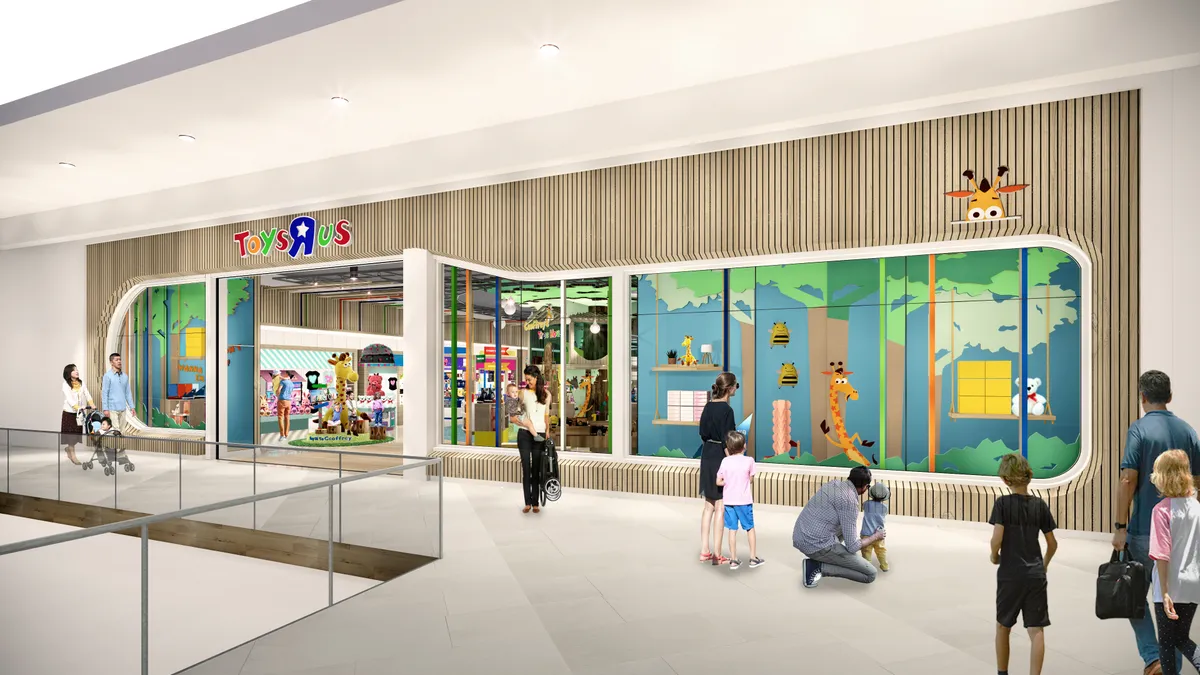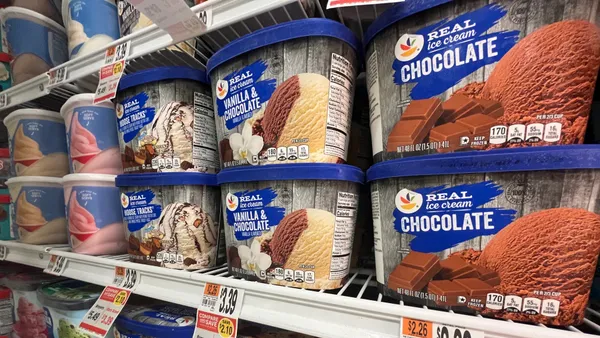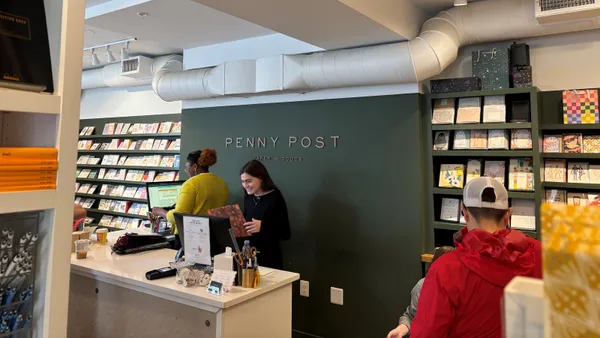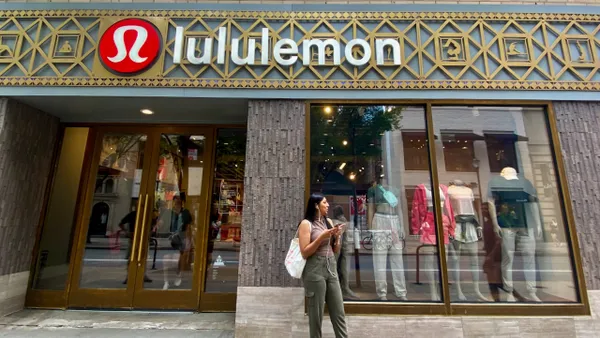Tru Kids, which owns the intellectual property of the old Toys R Us, announced earlier this month it is teaming up with retail concept b8ta to open new stores in time for the holiday season. The stores will be about 6,500 square feet — a fraction of the size of the old Toys R Us locations, which were about 40,000 square feet — and be located at The Galleria in Houston and the Westfield Garden State Plaza mall in Paramus, New Jersey.
The store concept taps b8ta's model of charging vendors for space within the stores, with the sales going back to the vendors. And while b8ta generally focuses on electronics, hosting products such as Quip's electric toothbrushes and Google's Home Hub, CEO Vibhu Norby told Retail Dive in an interview earlier this month that toys is a "very adjacent" category.
Toys R Us once touted itself as being the premier toy destination when it came to showrooming and testing products. "Just one toy 'showroom' exists in the United States, Europe, Asia, Africa, and the Middle East, affording children and toy manufacturers across the globe a chance to create life-long memories through gifts and souvenirs 365 days each year," former Toys R Us CEO Dave Brandon said in the company's 2017 bankruptcy filing. "That one toy showroom — Toys 'R' Us — is here to stay."
After its demise, other retailers tried to scoop up the market share that was left behind. Walmart, Amazon and Target all ramped up their own toy offerings last holiday season, with the latter clearing 250,000 square feet of space to accommodate additional toy merchandise and in-store events.
The Tru Kids and b8ta stores will feature a theater to showcase movies, shows or games, as well as a treehouse in the center of the store, a virtual reality room and an event space. In a way, this partnership with b8ta fulfills some of the plans Toys R Us had laid out in its Ch. 11 filing two years ago.
Brandon had said that the company was "developing and implementing initiatives to further improve the shopping experience at Toys 'R' Us stores. Once these initiatives are implemented, Toys 'R' Us stores will be interactive spaces with rooms to use for parties, live product demonstrations put on by trained employees, and the freedom for employees to remove product from boxes to let kids play with the latest toys."
And just like b8ta, which started as a way to give emerging brands and products a platform more visible to consumers, the new Toys R Us won't limit its space to the largest brands in the business. Tru Kids CEO Richard Barry told Retail Dive in an interview earlier this month that the stores will "of course have the big guys," but also alluded to having smaller toy brands as well, ones that "perhaps you've never seen before."
The discussion forum on RetailWire asked its BrainTrust panel of retail experts the following questions:
-
Do you expect the joint venture of Tru Kids and b8ta to "create a new, highly-engaging retail experience designed for kids, families and to better fit within today's retail environment?"
-
What do you think of the business model whereby manufacturers pay for space and services and keep 100% of sales made in stores?
Here are eight of the most insightful comments from the discussion. Comments have been edited by Retail Dive for length and clarity.
1.) Showroom stores work best for toys
Lee Peterson, Executive Vice President of Thought Leadership and Marketing, WD Partners: I've always thought that a "showroom" store would be best for toys, including within today's big box stores. You know, Bonobos (play with, then scan and ship-to-home purchases), only with toys. Instead of stacked boxes, you use the space they take to let customers play with/touch/inspect the product (and so, obviously, could their kids) and then walk out without said cumbersome box, which would be waiting for them at home.
B8ta gets that so, at the very least, this is a great test that Walmart, Target and all department stores should watch closely.
2.) The concept will likely resonate with customers
Jeff Sward, Founding Partner, Merchandising Metrics: With b8ta in the driver's seat, I have a high level of confidence that the model will resonate with customers. My mantra is "Explore + Experiment = Experience" and that is exactly what this sounds like. The holiday performance of the prototypes will help them sort out the math and the logistics.
3.) Consumers' positive sentiment of the brand will likely lead to success
Lee Kent, Principal, Your Retail Authority, LLC: The brand is affectionately regarded and therefore has a great chance for success here. I think kids and parents alike will love this concept that offers a great experience as well as helps determine what kinds of things attract their kids. There is a learning aspect in there too. I am not sure how the model works with b8ta so I cant speak to that but to me this is a win-win-win.
4.) 'It's too late'
David Dorf, VP Product Strategy, Infor Retail: I think it's too late — kids don't know the brand anymore. The concept might work in a few flagships, but it doesn't sound scalable.
5.) It's essential to create an organized experience, not a 'free for all'
Cynthia Holcomb, Founder and CEO, Prefeye - Preference Science Technologies Inc.: From the consumer side, the Toys R Us brand is about aisles and aisles of toys for kids. Not adults. Kids don't care nor are they aware of the business criteria adults impose on a toy store. A "store" filled with toys needs no branded explanation to a youngster. Walmart, Target, and others usually have only one or two aisles for toys.
Exciting — an innovative joint venture of Tru Kids and b8ta. A destination in the making if those in charge create a dynamic, organized experience, not a "free for all" for both kids and adults.
6.) Children seize moments
Christopher Ramey, President, Affluent Insights & The Home Trust International: Children just want to have fun. They seize moments; only what's in front of them at that time really matters.
Putting toys in the hands of the ultimate influencers makes each item an impulse purchase. No child ever suggested a killer toy should be bought on a different day.
I see a big win.
7.) Keeping product assortment interesting may pose a challenge
Mark Ryski, Founder, CEO & Author, HeadCount Corporation: It's an interesting approach, and I give the venture even-up odds for creating a cool retail experience. However, the big question will be: Can it scale profitably? In this regard, I'm not sure. Business models like the one described require lots of coordination with manufacturers. Keeping the environment fresh and interesting is hard to execute consistently. I admire the effort and the approach, but it's all very small and nascent.
8.) Will this translate into a long-term relationship with consumers?
Harley Feldman, Co-founder and CMO, Seeonic, Inc.: The new experience at Toys R Us will be stimulating and should engage children and their parents beyond the experience in the old style stores. This will result in short-term sales as the experience should translate into a fun experience trying out new games. The real question is, will it translate into a long term relationship between the shoppers and the Toys R Us brand?
The "keep 100% of sales" model cannot work. How does Toys R Us make any money if 100% of sales go out the door? I could understand Toys R Us returning a percentage of the sales to the manufacturer, but 100% makes no sense. The good part of the business model is having the manufacturer hold the product cost risk until a sale occurs.














